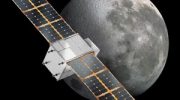The source of the signal is billions of light years away from Earth.

Astronomers managed to record a fast radio burst (FRB), which lasts 1000 times longer than other similar cosmic signals. According to scientists, it may come from a neutron star “on steroids”, according to Space.com.
Also read: Astronomers discover a new record-breaking star at the center of our galaxy
Most FRBs, which are powerful bursts of radio waves from galaxies billions of light-years away that last for milliseconds and then disappear. Most often they are single events.
The new signal, FRB 20191221A, lasts three seconds, 1,000 times longer than other similar radio bursts. In addition, it has the clearest repeating structure of any such signal known so far.
According to Daniele Micilli of the Institute of Astrophysics and Space Research. According to MIT, the signal had periodic spikes that sounded very clear, repeating every fraction of a second, and looked like a heartbeat.
In the future, scientists hope to catch other bursts from this source, which will help determine its nature more precisely. In addition, they hope that FRB 20191221A can be used as a type of “astrophysical clock” due to its highly reliable periodicity. Because the frequency of this burst will change as the source moves away from Earth, these changes can be used to measure the expansion of the universe.
Since the first FRBs were discovered in 2007, scientists have been trying to figure out what their source is. The most likely source candidates so far are considered to be types of neutron stars called radio pulsars and magnetars. A new study may confirm that this theory is correct, as there are not many known objects in the universe that can emit clearly periodic signals.
Previously scientists from the National Astronomical Observatory of the Chinese Academy of Sciences with the help of the three fast radio bursts were detected in the world by the FAST radio telescope. According to researchers, these radio bursts occurred billions of years ago, when the universe was young.




